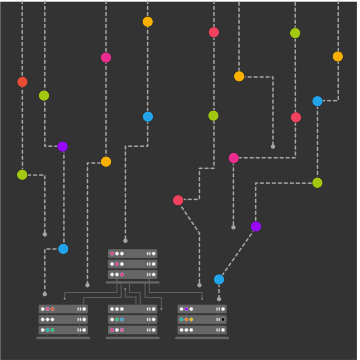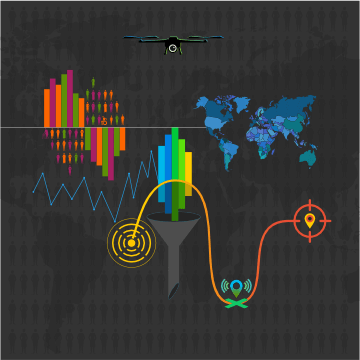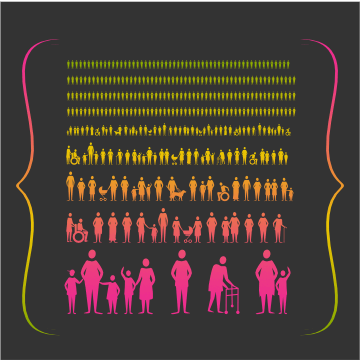What constitutes ‘good data’ in the creative economy?
Helen Kennedy, Laura Mayne, Jedrek Niklas, Susan Oman, Robin Steedman, Mark Taylor, David Beer, Helen Thornham
Background
Digital data are increasingly vital to the UK’s economic growth and prosperity, as ever more sectors, services and experiences become data-driven. In our so-called age of big data, companies and organisations across all sectors, including the creative economy, gather, mine and analyse data to try to improve what they do and how they do it. Our current data-rich conditions create a range of opportunities to improve the efficiency and effectiveness of organisational operations, structures and outputs, but they are not without problems, as ‘datafication’ also brings with it a number of challenges. Researchers and activists have expressed concern, for example, about the possibility of increased surveillance, threats to privacy, new forms of algorithmic control, and the expansion of new and old inequalities and forms of discrimination that intensified conditions of datafication make possible.
Digital data are increasingly vital to the UK’s economic growth and prosperity, as ever more sectors, services and experiences become data-driven. In our so-called age of big data, companies and organisations across all sectors, including the creative economy, gather, mine and analyse data to try to improve what they do and how they do it. Our current data-rich conditions create a range of opportunities to improve the efficiency and effectiveness of organisational operations, structures and outputs, but they are not without problems, as ‘datafication’ also brings with it a number of challenges. Researchers and activists have expressed concern, for example, about the possibility of increased surveillance, threats to privacy, new forms of algorithmic control, and the expansion of new and old inequalities and forms of discrimination that intensified conditions of datafication make possible.
These concerns raise broad questions about what constitutes good, fair, ethical and just data practices. In this context, if the UK is to have a successful, data-driven creative economy, addressing the question of what good, fair, ethical and just data and data analytics practices might look like within this sector is an urgent priority. ‘Good’ is, of course, a complex, normative notion which could have multiple meanings. We use this term because it is open for actors in partner organisations to define in their own terms and in relation to their own organisations and sectors. Good Data asks: What does good data / good data practice mean for specific actors in specific creative economy organisations?

Case study projects
We are addressing this question by working with four creative economy partner organisations.
Laura Mayne (working with David Beer) took as a case study the British Film Institute (BFI), a charity that maintains the world’s largest film archive and allocates funding to film production, distribution, audience development, and research. This project aimed to assess the use of data to measure and inform diversity policy, particularly in relation to issues of class and social mobility. Laura has a background in film studies and history and her previous work has focused on postwar British cinema with an emphasis on industrial histories, institutional practices and production cultures.
Jedrzej Niklas (working with Helen Thornham) worked with a trade body for the video game industry in the UK. The partnership entailed designing a survey that helps to monitor diversity and equity among people employed by video games companies. The project focused on problems related to gender and ethnic inequalities and social mobility. It also reflected on the ethical and legal aspects of collecting sensitive personal data. Jedrzej has a background in law and specialised in data protection and relations between human rights, new technologies and public institutions. Previously he was a postdoctoral researcher at the London School of Economics and Political Science, doing research on civil society organizations and the rise of automated discrimination.
Susan Oman (working with Mark Taylor) was a CEEF Fellow focusing on sharing knowledge of good data practices and how inequality metrics work within national funders and funded organisations in the creative and cultural sector. The project built on Susan’s previous work with Arts Council England, which looked at introducing social metrics to publicly-funded cultural organisations and the policy and practice implications of findings on sector-wide inequality data. Susan has a background in partnership working across HE and the cultural sector. Susan’s work interrogates how data ‘works’ at different levels in society and how it ‘moves’ to inform institutional practices or reflect social change.
Robin Steedman (working with Helen Kennedy) was a CEEF Fellow working with BBC R&D. This partnership entailed designing a survey assessing public opinion about new models for managing personal data, such as Data Trusts. This project built on a past partnership with BBC R&D examining what diverse people think and feel about how the BBC mines and uses their personal data through signed in services. Both of these projects emphasise the importance of inclusivity and accounting for how people feel in designing new data practices. This Good Data project is described in more detail in Public Trust in data-driven services and data management models. Robin has a background in film and media industry studies and her previous research focused on how class and gender shape the working biographies of female filmmakers in Nairobi, Kenya.
More information about the project
What Constitutes ‘Good Data’ in the Creative Economy? (or Good Data) ran from January to July in 2019, and was funded by the Arts and Humanities Research Council’s Creative Economy Engagement Fellowship Scheme (or AHRC CEEF).
Good Data was co-ordinated by Professor Helen Kennedy of The University of Sheffield, with Professor David Beer (University of York), Dr Mark Taylor (University of Sheffield) and Dr Helen Thornham (University of Leeds) as co-investigators. Four Creative Economy Engagement Fellows explored the question in the project’s title through case study research in media and cultural industry organisations.


